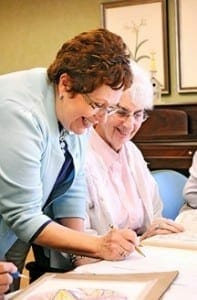Although Alzheimer’s disease is not a normal part of aging, the risk of developing the illness rises with advanced age. Current research from the National Institute on Aging indicates that the prevalence of Alzheimer’s disease doubles every five years beyond age 65.
Residents of retirement communities that offer a full continuum of care have peace of mind in the event that they require memory support services. At St. George Village, residents with dementia and Alzheimer’s have access to Friendship House, a neighborhood devoted to their special needs. Friendship House features a person-centered approach that allows family and caregivers to relate to the person for whom they are providing care as they would to their own best friend. This “Best Friends” approach seeks to maximize the strengths of the memory impaired person — caregivers as well as SGV staff are taught techniques and interventions that help them understand what types of situations motivate, stress or relax their Best Friend and how to respond accordingly.
Recognizing that caregivers often “lose” the person they are caring for in the diagnosis and the bizarre behavioral expressions of dementia or Alzheimer’s, this training helps them provide a better life for their family member or spouse. Oftentimes, caregivers must realize that they need to be care “assisters” rather than care “doers.” By realizing that prompts and cues are more important than doing a particular task, everything becomes an activity done with a special “knack,” allowing caregivers to focus on the joy of the moment.
The Best Friends approach to care seeks to reclaim the unique personhood of those we care about and allow them to be successful each and every day.

